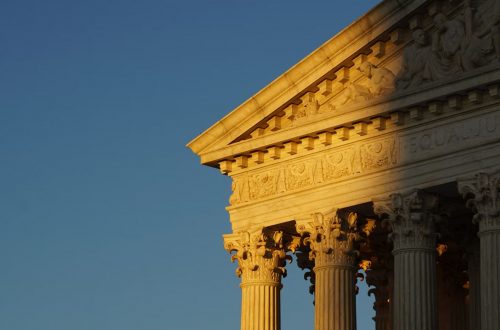 Is your doctor a believer? If not, a new study suggests that the care he is giving you may be inferior to that of believing doctors. The study appears in the Journal of Medical Ethics, and in it Dr. Clive Seale surveys more than 3,700 British doctors, of whom 2,923 reported on how they took care of their last terminally ill patient. In short, “Doctors who are atheist or agnostic are twice as likely to make decisions that could end the lives of their terminally ill patients, compared to doctors who are very religious” (AP report).
Is your doctor a believer? If not, a new study suggests that the care he is giving you may be inferior to that of believing doctors. The study appears in the Journal of Medical Ethics, and in it Dr. Clive Seale surveys more than 3,700 British doctors, of whom 2,923 reported on how they took care of their last terminally ill patient. In short, “Doctors who are atheist or agnostic are twice as likely to make decisions that could end the lives of their terminally ill patients, compared to doctors who are very religious” (AP report).
Medical care is not value-neutral. That much is clear from this study. In fact, the researcher concludes that doctors are ethically bound to inform their patients how doctors’ values inform their clinical decision-making. Not if their values inform their decisions, but how.
If you are interested in reading the study, you can buy and download an electronic version here.




10 Comments
Nathan
“Doctors who are atheist or agnostic are twice as likely to make decisions that could end the lives of their terminally ill patients, compared to doctors who are very religiousâ€
There are more criteria other than mortality to consider when rating the quality of care. That being said, the doctor should find out the expectations of the patient and try and carry out those goals rather than the doctor’s personal goals.
BPRjam
Religious beliefs make a difference in virtually every profession, no doubt.
But I’m not convinced it is wrong to “end the life of a terminally ill patient”. That’s not to say I agree with euthanasia, but rather to say that sometimes the best decision is to let go of continuing medical care.
Those who have had a close relative deal with terminal cancer know how tough it can be to make the decision between treating the cancer and letting nature take its course. In most cases, I can’t find fault with either decision.
That being said, what constitutes “inferior treatment”? Is it really inferior to make a decision that could end the life of a terminally ill patient, such as not suggesting additional treatment?
David Vinzant
No Denny, the report does not say that non-believing doctors give “inferior” care. Here’s what is said in the summary of findings:
“Independently of speciality, doctors who described themselves as non-religious were more likely than others to report having given continuous deep sedation until death, having taken decisions they expected or partly intended to end life, and to have discussed these decisions with patients judged to have the capacity to participate in discussions.”
Sounds like this may have actually been superior care.
henrybish
I’m from the UK, and first read of this story on the BBC news website – I was shocked (although shouldn’t be) at the massive negative spin they put on it. They draw opposite conclusions to Denny:
http://www.bbc.co.uk/news/health-11083891
mike
Having seen two grandparents wither away over a period of months in comas following massive strokes, I am far from convinced that taking all steps to preserve the life of terminally ill patients is always a good thing. Sorry to say, but I’d rather be taken care of by the agnostic doctor who discusses the options with me or my family than a believer bound and determined to extend their patients life no matter what.
RD
Mike makes a very poignant statement. End of life issues are a reality that, sadly, many in our churches are not facing realistically. Not to mention the enormous costs associated with medical proceedures that are performed during the last six months of life in an effort to sustain a terminally ill patient. Studies are showing that these expenses are among the leading reasons that the healthcare system in america is financially upside down. I think there is great wisdom in Mike’s statement: “I am far from convinced that taking all steps to preserve the life of terminally ill patients is always a good thing.”
Brian Krieger
Just a point of clarification, the highlighted finding about end of life is not “taking all steps to preserve the life”, but is (from the report) “non-religious were more likely than others to report having given continuous deep sedation until death, having taken decisions they expected or partly intended to end life,”. I am too cheap to buy the report, so the findings may flesh out a little more along the former for all I know.
And, RD, you touch on something that occurred to me as I read the report. What is driving the decision? I don’t know, but I wonder if expenses are a driving factor. Some of the difficulty does lie with the idea of “terminally ill” and where a line is/should be (for treatment). I would venture that those holding to an expense-based viewpoint would err on the wrong side of life versus money. But that is total speculation and isn’t from the report (though it is interesting that the abstract’s conclusion does state “Greater acknowledgement of the relationship of doctors’ values with clinical decision-making is advocated.”).
Brian Krieger
Correction, I read the (very brief) abstract, not the report.
Donald Johnson
I have read that the most common reason for declaring bankrupcy is medical bills. Many Americans are one medical crisis away from insolvency.
Kamilla
I think there is a difference between the care doctors give overall and end-of-life care. Personally, I have fired two doctors who were devout believers (one heavily involved in medical missions) because they gave me dangerous and very dubious advice.
I also don’t know of a single OB/GYN who is a Christian and doesn’t prescribe birth control that is potentially abortifacient.
I’d also be interested to learn what affect the British NHS has on end-of-life decisions in general.
Kamilla